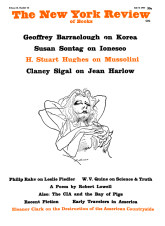In response to:
Looking Backward from the June 11, 1964 issue
To the Editors:
Some of your reviewers display an inordinate zeal for correcting minor errors in other people’s English. Perhaps you will permit a reader to correct one of these “corrections.”
In his review entitled “Looking Backward” in your issue of June 11th, Jason Epstein writes and quotes as follows:
And it is likely to follow from a temperament which “does not object to coercion or arbitrary power so long as it [sic] is used for what [it] regards as the right purposes.”
I can perceive no meaning or point to the “[sic]” here other than as an indication that Mr. Epstein thinks that “coercion or…power” should be followed by “they are” rather than by “it is.” If this in fact is what Mr. Epstein means by his “[sic],” he is, of course, quite wrong: since the antecedents “coercion” and “power” are linked by a disjunctive rather than a copulative conjunction, they remain singular. Thus Fowler’s Dictionary of Modern English Usage, in entry 3 under the heading “Number,” gives the example “…Mother or child is (not are) to die.”
I think Mr. Epstein owes an apology to the author of the sentence sic-ed at.
William F. Kehoe
Medford, Mass.
Jason Epstein replies:
Mr. Kehoe wants the conjunction to be disjunctive, but the nouns, though they are siblings and may even be twins, copulate nevertheless. The sense of Fowler’s illustration is that either mother or child is to die. The subjects are alternative. The sense of Mr. Hayek’s (rather muddy) phrase is that both coercion and arbitrary power…are, etc. The subject here is compound and requires the plural pronoun.
This Issue
July 9, 1964



